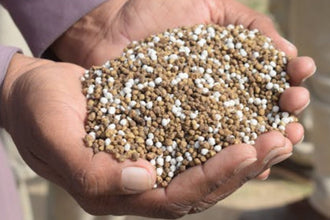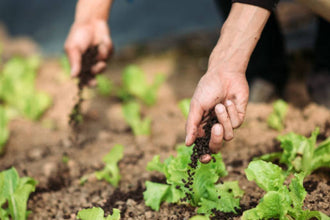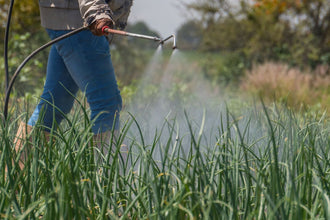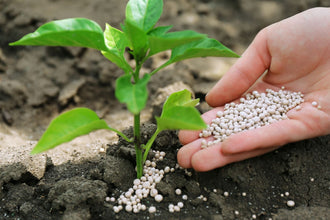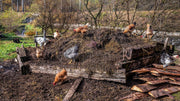
Chicken manure is what separates the pros from weekend gardeners who wonder why their tomatoes never look like the ones at farmers markets. Most people grab whatever fertilizer is on sale at the garden center. Professional gardeners know better. They use aged chicken manure because it works better than anything else they've tried.
You see this stuff in every prize-winning garden for a reason. Professional gardeners aren't throwing money around on fancy products. They stick with what gives them consistent results year after year. The secret isn't some expensive miracle formula. The best gardens start with chicken poop that's been sitting around long enough to become garden gold.
Professional gardeners test everything. They've burned plants with synthetic fertilizers. They've wasted money on organic blends that promised amazing results but delivered disappointment. After years of trying different approaches, most serious gardeners end up using chicken manure as their go-to fertilizer.
Why Professional Gardeners Choose Chicken Manure Over Everything Else
Walk through any commercial growing operation and ask what they use. Chicken manure comes up in almost every conversation. These people make their living growing plants, so they can't afford to mess around with products that don't work.
The numbers tell the story. Good chicken manure runs about 4-2.5-2 for nitrogen, phosphorus, and potassium. That ratio feeds plants without overwhelming them. Synthetic fertilizers dump too much nutrition too fast. Plants grow quickly but end up weak and attractive to pests.
Commercial vegetable growers love chicken manure because it fixes soil problems while feeding plants. Sandy soil holds water better after chicken manure applications. Clay soil becomes easier for roots to penetrate. This double benefit saves professional growers time and money they would spend on separate soil amendments.
Professional greenhouse operations report yield increases of 15-30% after switching from synthetic fertilizers to aged chicken manure. The improvement comes from better nutrition combined with healthier soil that supports stronger plants season after season.
The Science Behind Superior Results
The microorganisms living in composted chicken manure create a whole ecosystem in garden soil. These tiny helpers form partnerships with plant roots, making it easier for plants to grab nutrients from the soil. Synthetic fertilizers actually kill many of these beneficial microbes.
University research shows that soils treated with chicken manure hold water better, drain properly, and contain more organic matter compared to synthetically fertilized soils. Plants growing in this improved soil handle drought stress better and show natural resistance to common pests and diseases.
Chicken manure doesn't just feed plants today. It builds soil health that keeps paying dividends for years. Professional gardeners understand this long-term approach creates better gardens with less work over time.
How to Source and Prepare Chicken Manure Like the Pros
Never use fresh chicken manure straight from the coop. Professional gardeners learned this lesson the hard way early in their careers. Raw chicken manure will burn plants and might contain harmful bacteria that make people sick.

Good chicken manure needs time to age and compost properly. This process takes 6-12 months, during which beneficial bacteria break down the raw material into plant-friendly nutrients. Professional composters mix chicken manure with sawdust, straw, or shredded leaves to get the carbon-to-nitrogen ratio right.
Temperature matters during composting. Chicken manure compost should reach 130-160 degrees Fahrenheit to kill pathogens while keeping beneficial organisms alive. Professional gardeners use compost thermometers to monitor this process because guessing doesn't work when plant health is on the line.
Quality Indicators Professionals Look For
Experienced gardeners can tell good chicken manure by smell, appearance, and texture. Quality composted chicken manure smells like rich earth, not ammonia. The texture should crumble in your hands and look dark brown or black, similar to expensive potting soil.
Avoid chicken manure that looks slimy, has white fuzzy mold, or smells like a barn on a hot day. These warning signs mean the composting process went wrong or the material got contaminated somehow.
Many professional operations buy their chicken manure from organic farms where the birds eat antibiotic-free, hormone-free feed. This ensures the finished product meets organic standards and contains no synthetic chemical residues that might affect plant growth.
Application Methods That Separate Pros From Amateurs
Professional gardeners apply chicken manure strategically instead of just spreading it around randomly. They know that timing, placement, and quantity all matter for getting the best results. Most professionals put down their chicken manure in early spring, 2-4 weeks before planting time.
The standard rate for established gardens is 2-3 inches of composted chicken manure worked into the top 6 inches of soil. New garden beds might get up to 4 inches, with extra time allowed for soil integration before planting begins.
Professional vegetable growers often create custom blends by mixing chicken manure with other organic materials. A typical professional mix might combine aged chicken manure with kelp meal, rock phosphate, and greensand to create a complete slow-release fertilizer system that feeds plants all season long.
Seasonal Application Strategies
Spring applications give soil microorganisms time to wake up and get active before peak growing season starts. Professional gardeners in cold climates apply their chicken manure 4-6 weeks before the last frost date, allowing soil biology to establish before transplanting begins.
Fall applications work great for perennial gardens and next year's vegetable plots. Applying chicken manure in late fall lets winter weather continue breaking down organic matter, creating even richer growing medium by spring planting time.
Professional greenhouse managers often make liquid chicken manure tea throughout the growing season. They steep aged chicken manure in water for several days, then dilute the resulting liquid for gentle, ongoing fertilization that doesn't shock plants.
The Cost Advantage That Makes Professionals Smile
Professional gardeners operate on tight budgets because their livelihoods depend on keeping costs reasonable while maximizing results. Chicken manure costs way less per square foot than premium synthetic fertilizers while delivering better long-term performance.
A typical professional vegetable garden needs about $50 worth of chicken manure per 1,000 square feet each year. The same coverage using quality synthetic fertilizer runs $150-200 annually. Over five years, the savings add up to serious money for larger growing operations.
The cost savings get even better when you consider reduced need for other soil amendments. Gardens regularly treated with chicken manure need fewer applications of lime, sulfur, or other pH adjusters because the organic matter naturally buffers soil pH levels.
Long-term Economic Benefits
Professional market gardeners report fewer crop losses from pest and disease problems after switching to chicken manure. Healthier plants grown in biologically active soils show natural resistance to common garden troubles, reducing the need for expensive pest control measures.
The soil improvement effects of chicken manure build up over time. Gardens treated consistently for 3-5 years develop such rich, fertile soil that fertilizer requirements actually go down. This allows professional growers to reduce input costs while maintaining or improving yields.
Many professional gardeners eventually stop using synthetic fertilizers entirely after building their soil with chicken manure applications. The mature soil ecosystem becomes self-sustaining, requiring only occasional organic matter additions to maintain peak fertility levels.
Common Mistakes That Prevent Success
Amateur gardeners often mess up with chicken manure because they don't follow professional methods. Using fresh manure, applying too much at once, or bad timing can create problems that give chicken manure an undeserved reputation for being difficult to use.
The biggest mistake is putting fresh chicken manure directly on growing plants. This almost always results in nitrogen burn, stunted growth, or dead plants. Professional gardeners never skip the composting or aging process, no matter how eager they are to get started.
Over-application is another frequent error. More chicken manure doesn't automatically mean better results. Professional gardeners understand that soil biology needs time to process organic matter. Too much at once can create conditions that actually harm beneficial microorganisms.
Timing and Placement Errors
Many home gardeners apply chicken manure too close to planting time, not giving adequate time for soil integration. Professional gardeners plan their chicken manure applications months ahead, giving soil organisms time to process the organic matter before plants need maximum nutrition.
Poor placement causes problems too. Dumping chicken manure right around plant stems creates hot spots that damage roots. Professional gardeners spread chicken manure evenly across growing areas instead of concentrating it around individual plants.
Weather matters as well. Applying chicken manure right before heavy rains washes away nutrients before plants can benefit. Professional gardeners check weather forecasts and plan applications during stable weather periods when rain won't immediately wash away their investment.
Making the Switch to Professional-Grade Results
Professional gardeners didn't become experts overnight. They developed their skills through careful observation, experimentation, and learning from mistakes. Home gardeners can get similar results by adopting professional methods and sticking to consistent application schedules.
Start with a soil test to understand current nutrient levels and pH. Professional gardeners never guess about soil conditions. They use soil testing results to determine appropriate chicken manure application rates and identify any additional amendments needed for optimal plant growth.
Begin with a small test area to see how your specific soil responds to chicken manure applications. Professional gardeners often trial new methods on limited areas before making garden-wide changes. This approach prevents costly mistakes while building confidence in new techniques.
The transition to chicken manure as your primary fertilizer might take 2-3 seasons to show full benefits. Professional gardeners understand that soil building happens gradually. Patience during the transition period leads to decades of superior growing results that make the wait worthwhile.
Professional gardeners know what many home gardeners are discovering. Chicken manure provides the right combination of nutrition, soil improvement, and cost-effectiveness that creates thriving gardens year after year. These experienced growers build their reputations on consistent results, and properly aged chicken manure delivers the reliability that separates professionals from weekend gardeners who wonder why their plants never look quite right.
Why Fancy Chicken Organic Pelletized Manure Stands Above the Rest
Convenience Meets Professional Results
Professional gardeners used to spend hours composting raw chicken manure or hunting down properly aged supplies from local farms. Fancy Chicken changed that game completely. Their organic pelletized chicken manure delivers the same soil-building power that pros depend on, but in a clean, easy-to-handle format that works right out of the bag.
The 4-2.5-2 NPK ratio in Fancy Chicken matches what experienced growers consider ideal for most crops. No guessing about nutrient content or worrying about inconsistent batches. Each bag delivers the same reliable nutrition that builds stronger plants and healthier soil season after season.
The Processing Advantage That Makes a Difference
Fancy Chicken uses a specialized pelletizing process that locks in nutrients while creating slow-release properties professional gardeners love. The pellets break down gradually in soil, feeding plants steadily instead of dumping nutrition all at once like synthetic fertilizers do.
This controlled release means fewer applications throughout the growing season. Professional market gardeners report applying Fancy Chicken just 2-3 times per year compared to monthly synthetic fertilizer schedules they used previously. The time savings alone makes switching worthwhile for busy commercial operations.
Key Benefits That Keep Professionals Coming Back
Professional growers choose Fancy Chicken for specific reasons that directly impact their bottom line:
-
Consistent nutrient profile - Every bag contains the same 4-2.5-2 ratio
-
Clean handling - No messy compost piles or storage issues
-
Extended feeding - Slow release reduces application frequency
-
Soil building - Improves soil structure while feeding plants
-
Organic certification - Meets strict organic growing standards
-
Microbial boost - Supports beneficial soil organisms that synthetics destroy
Storage and Application Simplicity
Raw chicken manure requires careful storage to prevent contamination and odor problems. Fancy Chicken pellets store easily in any dry location without attracting pests or creating unpleasant smells. Professional greenhouses keep bags stacked neatly year-round without worrying about spoilage or degradation.
Application becomes straightforward with pelletized form. Professional growers can use standard spreaders or apply by hand without dealing with sticky, uneven compost that clogs equipment. The uniform pellet size spreads evenly across growing areas, ensuring consistent nutrition distribution that raw manure can't match.
Cost-Effective Professional Solution
Fancy Chicken eliminates the labor costs associated with composting raw chicken manure or transporting bulk materials. Professional operations factor in time savings, storage efficiency, and consistent results when calculating true fertilizer costs. Many commercial growers find that Fancy Chicken actually costs less per square foot than managing their own composting systems.
The concentrated nutrition in pelletized form means less product needed per application compared to bulky raw materials. Professional vegetable growers typically use 40-50% less Fancy Chicken by volume compared to traditional composted chicken manure while getting equivalent or better results in plant growth and soil improvement.
Start Growing Like a Professional Today
Professional gardeners protect their reputations by using fertilizers that deliver consistent results every single season. They can't afford crop failures or disappointing harvests that come from unreliable nutrition programs.
Fancy Chicken gives you access to the same professional-grade organic fertilizer that commercial growers depend on for their livelihood. Your garden deserves the same attention to quality and performance that separates prize-winning operations from average backyard plots that struggle year after year.




